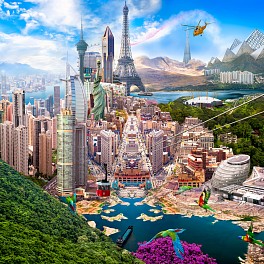BIOGRAPHY

“Tom Leighton is an artist, photographer and printmaker, with a fascination with architectural structure and form. Trained at the Royal College of Art in London, he expertly layers and manipulates his photographic images, creating work which is both beautiful and provocative, encouraging us to imagine different possibilities for the world around us.
Leighton’s close and conjectural explorations are about environments both natural and constructed. Travelling between ancient cities and the most futuristic developments of Hong Kong and the Middle East, he works with buildings and cityscapes which are part of an international iconography - and those that are more hidden from the tourist’s gaze. The elaborate images he then creates, ask about our cities and what they might become. He raises questions about how we live and move within the urban centre, how populations can cope and adapt to challenging expansion and change. In posing these questions, the images are nonetheless beautiful; Leighton seeks beauty in everything, from functional buildings to the most ornate architecture. He repeats motifs in unexpected places, repositions existing structures and contrasts the natural and the artificial: bright city lights set against natural night skies, concrete against greenery, business against eerie nighttime stillness.
More recently, he has turned very specifically to design in nature - and the invitation here might again be to contrast the power inherent in the construction, with a sense of its fragility and impermanence. Again his observation is careful and questioning. Again he enhances and manipulates and abstracts, focusing our attention on the intricacy of a leaf or the layering of feathers in flight or the implied volcanic force which has created a tower of rock at the edge of the sea. This work, like his cityscapes, is beautiful and surprising, and, like them, carries a mark of the surreal.
Embodied in all of his images, whether the source is urban architecture or the structures of nature, is a sense of wonder. At once futuristic and reflective, Leighton’s work demands multiple takes.”
